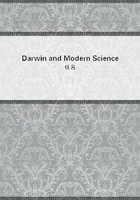
第186章
By J.W. JUDD, C.B., LL.D., F.R.S.
(Mr Francis Darwin has related how his father occasionally came up from Down to spend a few days with his brother Erasmus in London, and, after his brother's death, with his daughter, Mrs Litchfield. On these occasions, it was his habit to arrange meetings with Huxley, to talk over zoological questions, with Hooker, to discuss botanical problems, and with Lyell to hold conversations on geology. After the death of Lyell, Darwin, knowing my close intimacy with his friend during his later years, used to ask me to meet him when he came to town, and "talk geology." The "talks" took place sometimes at Jermyn Street Museum, at other times in the Royal College of Science, South Kensington; but more frequently, after having lunch with him, at his brother's or his daughter's house. On several occasions, however, I had the pleasure of visiting him at Down. In the postscript of a letter (of April 15, 1880) arranging one of these visits, he writes:
"Since poor, dear Lyell's death, I rarely have the pleasure of geological talk with anyone.")In one of the very interesting conversations which I had with Charles Darwin during the last seven years of his life, he asked me in a very pointed manner if I were able to recall the circumstances, accidental or otherwise, which had led me to devote myself to geological studies. He informed me that he was making similar inquiries of other friends, and Igathered from what he said that he contemplated at that time a study of the causes producing SCIENTIFIC BIAS in individual minds. I have no means of knowing how far this project ever assumed anything like concrete form, but certain it is that Darwin himself often indulged in the processes of mental introspection and analysis; and he has thus fortunately left us--in his fragments of autobiography and in his correspondence--the materials from which may be reconstructed a fairly complete history of his own mental development.
There are two perfectly distinct inquiries which we have to undertake in connection with the development of Darwin's ideas on the subject of evolution:
FIRST. How, when, and under what conditions was Darwin led to a conviction that species were not immutable, but were derived from pre-existing forms?
SECONDLY. By what lines of reasoning and research was he brought to regard "natural selection" as a vera causa in the process of evolution?
It is the first of these inquiries which specially interests the geologist;though geology undoubtedly played a part--and by no means an insignificant part--in respect to the second inquiry.